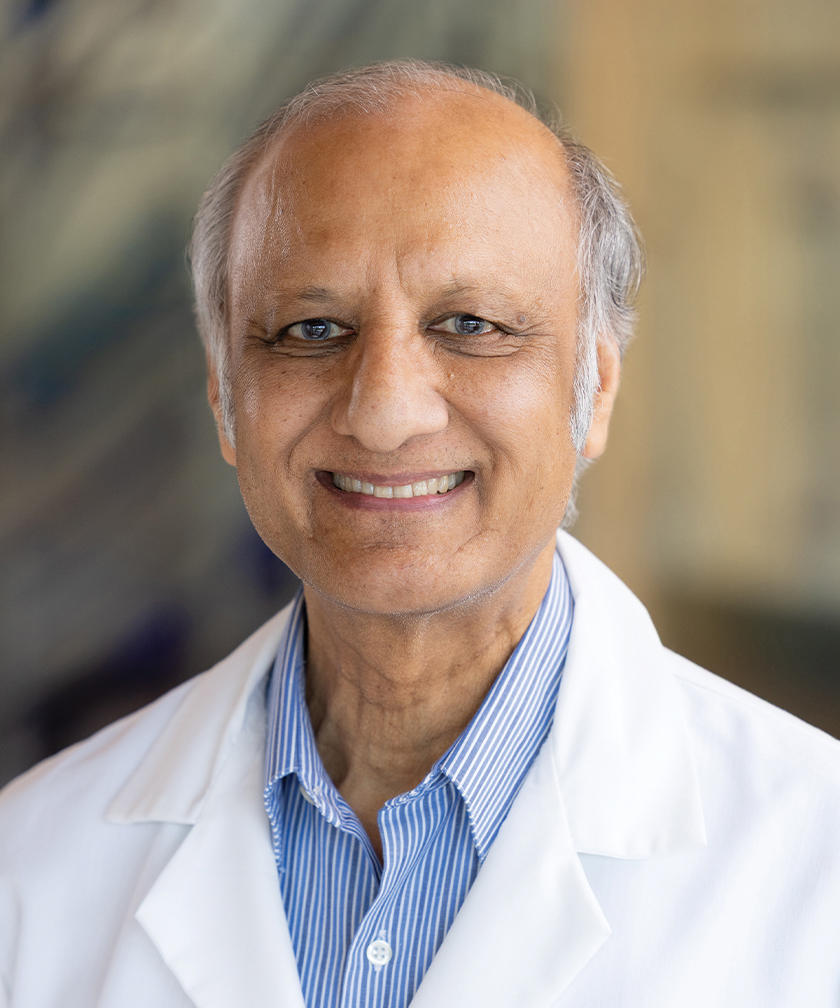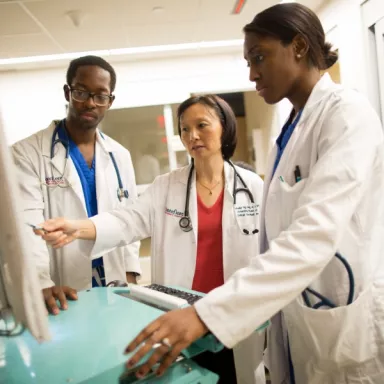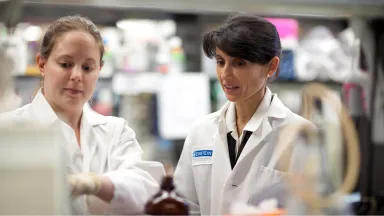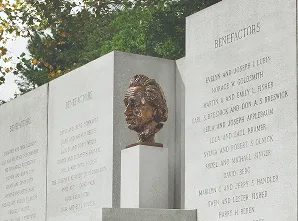
Sanjeev Gupta, M.B.,B.S., M.D.
- Professor, Department of Medicine (Hepatology)
- Professor, Department of Pathology
Area of research
- Liver regeneration in health and diseaseBiology and differentiation of hepatic stem cellsDNA damage response involving ATM and downstream pathwaysTranslational studies using liver cell and animal modelsTherapeutics including cell and gene therapy
Location
- Albert Einstein College of Medicine Jack and Pearl Resnick Campus 1300 Morris Park Avenue Ullmann Building 625 Bronx, NY 10461
Research Profiles
Professional Interests
Liver regeneration is critical for health. We focus on physiology of liver regeneration during development, early childhood and adulthood to inform mechanistic disruptions in diseases. The latter ranges from acute liver failure, effects of drugs, toxins, alcohol, virus hepatitis, obesity-related metabolic (or nonalcoholic) liver disease, chronic hepatitis, e.g., Wilson disease with copper toxicosis, and allograft rejection. The mechanisms concerning DNA damage response directed by ATM gene and downstream partners are of considerable interest to us.
These aspects are joined with study of cell type-specific contributions as well as aspects of stem cell biology for liver regeneration. We apply cell transplantation approaches to better understand the biology and regenerative potential of various cell types. Expression of therapeutic constructs and transplantation of those cells is another area of investigative interest. We address the role of endogenous stem/progenitor cells in therapeutic development. Tissue engineering to generate auxiliary liver has potential in these areas and is also advancing liver regenerartion in experimental models.
We use a variety of methods, including microarrays or deep sequencing for gene expression, cell and molecular biology methods, and multiple small and large animal models. The findings are integrated with analyses of human tissue and blood samples.
Unique aspects of our work include use of established drugs for mechanistic interrogations and therapeutic applications, and an uncommon depth and breadth of multidisciplinary tools. We collaborate with leading investigators at Einstein or elsewhere as appropriate.
Selected Publications
- Thirunavukkarasu C, Sharma Y, Tchaikovskaya T, Maslov AY, Gupta S. Transcriptional profiling reveals ataxia telangiectasia mutated pathways regulate joint copper and arsenic toxicity for hepatic metalloplasia and anti-cancer therapies. Life Sci. 2022 Jul 6;120787. doi: 10.1016/j.lfs.2022.120787.
- Chang CJ, Ge EJ Bush AI, Casini A, Cobine PA, Cross JR, DeNicola GM, Dou Q, Franz KJ, Gohil VM, Gupta S, Kaler SG, Lutsenko S, Mittal V, Petris MJ, Polishchuk R, Ralle M, Schilsky ML, Tonks NK, Vahdat LK, Van Aelst L, Xi D, Yuan P, Brady DC. Connecting copper and cancer from transition metal signaling to metalloplasia in the clinic. Nat Rev Cancer 2022 Feb;22(2):102-113. doi: 10.1038/s41568-021-00417-2. Epub 2021 Nov 11. PMID: 34764459
- Viswanathan P, Gupta P, Sharma Y, Maisuradze L, Bandi S, Gupta S. Caffeine disrupts ataxia telangiectasia mutated gene-related pathways and exacerbates acetaminophen toxicity in human fetal immortalized hepatocytes. Toxicology. 2021 May 7;457:152811. doi: 10.1016/j.tox.2021.152811. PMID: 33971260
- Viswanathan P, Sharma Y, Jaber FL, Tchaikovskaya T, Gupta S. Transplanted hepatocytes rescue mice in acetaminophen-induced acute liver failure through paracrine signals for hepatic ATM and STAT3 pathways. FASEB J 2021 Apr;35(4):e21471. doi: 10.1096/fj.202002421R. PMID: 33683737
- Jaber FL, Sharma Y, Mui BG, Kapoor S, Gupta S. Tumor necrosis factor directs allograft-related innate responses and its neutralization improves hepatocyte engraftment in rats. Am J Pathol 2021; 191(1):79-89. doi: 10.1016/j.ajpath.2020.09.014. Epub 2020 Oct 27. PMID: 33127336
- Viswanathan P, Sharma Y, Gupta S. Ataxia telangiectasia mutated pathway disruption affects hepatic DNA and tissue damage in nonalcoholic fatty liver disease. Exp Mol Pathol. 2020 Apr; 113:104369. doi: 10.1016/j.yexmp.2020.104369. Epub 2020 Jan 7. PMID: 31917286
- Gupta P, Sharma Y, Viswanathan P, Gupta S. Cellular receptor signaling and ATM pathway intersections regulate hepatic DNA repair. Cytokine 2020 Mar; 127:154946. doi: 10.1016/j.cyto.2019.154946. Epub 2019 Dec 11. PMID: 31837586
- Bandi S, Tchaikovskaya T, Gupta S. Hepatic differentiation in human pluripotent stem cells by developmental stage-specific metabolomics products. Differentiation 2019; 105:54-70. Jan 28;105:54-70. doi: 10.1016/j.diff.2019.01.005. PMID: 30776728.
- Kakabadze Z, Karalashvili L, Chakhunashvili D, Havlioglu N, Janelidze M, Kakabadze A, Sharma Y, Gupta S. Decellularized bovine placentome for portacavally-interposed heterotopic liver transplantation in rats. Mater Sci Eng C Mater Biol Appl. 2019 Apr; 97:293-301. doi: 10.1016/j.msec.2018.12.025. Epub 2018 Dec 10. PMID: 30678914.
- Yadav N, Jaber FL, Sharma Y, Viswanathan P, Gupta S. Efficient reconstitution of hepatic microvasculature by endothelin receptor antagonism in liver sinusoidal endothelial cells. Hum Gene Ther 2018; Sep 28. doi: 10.1089/hum.2018.166. PMID: 30266073,
- Sharma Y, Liu J, Kristian KE, Follenzi A, Gupta S. In Atp7b-/- mice modeling Wilson's disease liver repopulation with bone marrow-derived myofibroblasts or inflammatory cells and not hepatocytes is delterious. Gene Expr. 2018 Jul 20. doi: 10.3727/105221618X15320123457380. PMID: 30029699
- Bandi S, Gupta S, Tchaikovskaya T, Gupta S. Differentiation in stem/progenitor cells along fetal or adult hepatic stages requires transcriptional regulators independently of oscillations in microRNA expression. Exp Cell Res. 2018 Sep 1;370(1):1-12. doi: 10.1016/j.yexcr.2018.06.004. Epub 2018 Jun 6.
- Benten D, Kluwe J, Wirth JW, Thiele ND, Follenzi A, Bhargava KK, Palestro CJ, Koepke M, Tjandra R, Volz T, Lutgehetmann M, Gupta S. A humanized mouse model with liver fibrosis following expansion of transplanted hepatic stellate cells in injury and inflammation. Lab Invest 2018 Apr;98(4):525-536. doi: 10.1038/s41374-017-0010-7. Epub 2018 Jan 19.PMID: 29352225.
- Viswanathan P, Sharma Y, Gupta P, Gupta S. Replicative stress and alterations in cell cycle checkpoint controls following acetaminophen hepatotoxicity restrict hepatic regeneration. Cell Prolif 2018; Jun;51(3):e12445. doi: 10.1111/cpr.12445. Epub 2018 Mar 5. PMID: 29504225.
- Kakabadze Z, Kakabadze A, Chakhunashvili D, Karalashvili L, Berishvili E, Sharma Y, Gupta S. Decellularized human placenta supports hepatic tissue and allows rescue in acute liver failure. Hepatology 2018 May;67(5):1956-1969. PMID: 29211918.






